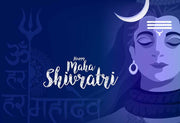Introduction:
In the heart of Hindu culture, Mahashivratri stands as one of the most significant and revered festivals. Observed annually in honor of Lord Shiva, the destroyer and transformer in the Hindu Trinity, Mahashivratri holds profound spiritual significance and cultural richness. This festival transcends geographical boundaries, bringing together devotees from all walks of life to celebrate the divine and seek blessings for spiritual growth and inner peace.
The Legend of Mahashivratri:
The legend behind Mahashivratri varies across different regions of India, but one of the most popular stories is the marriage of Lord Shiva to Goddess Parvati. According to Hindu mythology, this auspicious day marks the convergence of Shiva and Parvati, symbolizing the union of masculine and feminine energies. It is believed that on this night, Lord Shiva performs the cosmic dance of creation, preservation, and destruction, known as the Tandava Nritya, signifying the cycle of life and the universe's eternal rhythm.
Observance and Rituals:
Mahashivratri is observed with great devotion and fervor by millions of devotees worldwide. The day begins with devotees taking ritualistic baths in sacred rivers or lakes and visiting Shiva temples to offer prayers and perform traditional rituals. Throughout the day, devotees observe fasts and engage in meditation, chanting mantras, and reading scriptures dedicated to Lord Shiva. The night-long vigil, known as "Jagran," is a central aspect of Mahashivratri celebrations, where devotees stay awake, singing bhajans, and immersing themselves in prayer until dawn.
Significance of Fasting:
Fasting during Mahashivratri holds deep spiritual significance. It is believed that by abstaining from food and worldly pleasures, devotees cleanse their minds and bodies, enabling them to attain spiritual clarity and inner peace. Fasting is also seen as a form of penance, symbolizing devotion and dedication to Lord Shiva. Many devotees undertake strict fasts, consuming only water or milk, while others opt for fruit or vegetarian meals.
Celebrations Beyond Borders:
While Mahashivratri has its roots in Hindu tradition, its celebration transcends religious boundaries. In countries such as Nepal, Mauritius, and Indonesia, where Hindu communities reside, Mahashivratri is observed with equal enthusiasm and reverence. Additionally, the festival has gained recognition and popularity in countries with a significant Indian diaspora, such as the United States, the United Kingdom, and Canada, where temples organize special events and cultural programs to mark the occasion.
Spiritual Significance:
Mahashivratri holds profound spiritual significance beyond its cultural and religious aspects. It is a time for introspection, self-discovery, and spiritual renewal. The symbolism of Lord Shiva as the destroyer of ignorance and the embodiment of cosmic consciousness inspires devotees to overcome their inner demons and cultivate virtues such as compassion, humility, and detachment. Through prayers and meditation, devotees seek blessings for inner transformation, seeking to attain enlightenment and liberation from the cycle of birth and death.
Conclusion:
Mahashivratri is not merely a festival; it is a sacred journey that connects devotees to the divine and fosters spiritual growth and self-realization. It serves as a reminder of the eternal dance of creation and destruction, urging us to embrace life's impermanence and seek refuge in the eternal truth. As we celebrate Mahashivratri, let us immerse ourselves in devotion, gratitude, and reverence, acknowledging the divine presence within and around us. May the blessings of Lord Shiva illuminate our path and lead us to the ultimate realization of our true selves. Har Har Mahadev!


